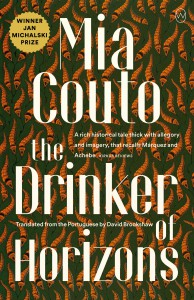This month, our editors feature three titles that showcase what’s possible when a writer fully showcases a firm and brilliant insight into their reality. From a collection of short stories that investigate the violence of Latin American society, to a multifaceted depiction of colonial Mozambique, to essays that focus on the intimate dailyness of human lives in twentieth-century China, these works educate, provoke, and enthrall. Read on to find out more!

Human Sacrifices by María Fernanda Ampuero, translated from the Spanish by Frances Riddle, The Feminist Press, 2023
Review by Rubén Lopez, Editor-at-Large for Central America
In Human Sacrifices, a collection of short stories, María Fernanda Ampuero traces the deterioration of individuals who have survived an overwhelmingly violent reality. With guts, blood, and a dense anger, she escorts us to a precipice with each story, strips us naked, and delivers us to a place where the wounds of Latin American are made real, and thus can be dissected. Published by Editorial Páginas de Espuma in 2021 and now appearing in English translation by Frances Riddle, the collection contains twelve stories that question our reality as one occasionally resembling more a traitorous deception.
The stories in Human Sacrifices are profoundly Latin American, but more specifically, they describe the experience of vulnerable Latin American women: a unique kind of hell. Gendered violence is present in almost all the narratives—a bone that vertebrates the monster: “Desperate women,” states one of the protagonists, “serve as meat for the grinder. Immigrant women are bones to be pulverized into animal fodder.” The opening story, “Biography,” is perhaps the most intimate, narrating in first person the terror of being a migrant woman in a foreign country. The narrative implants the dehumanizing panic of crossing invisible borders in pursuit of a less harsh horizon, as well as the fear of becoming an anonymous number, a disappeared woman, a name written on a wall. As the narrator states: “I remember someone once told me that the stars we see have been dead for a long time, and I think that maybe the disappeared women might also shine on like that, with that same blinding light, making it easier to find them.”
The prose also sinks its jaws into the hypocritical posture of the global north regarding the migration of impoverished people. While conservative politicians often use migrants to enunciate a vague terror that will destroy a certain way of life, the system sacrifices those bodies to sustain itself, perpetuating life for its own gain. The capitalist model hates migrants—but it needs them. It feeds on them. The monster in “Biography” explicitly constitutes that contradiction; it desires her labor, but it also wants to destroy her. “You know what my dogs feed on?” It asks mockingly, before declaring to the protagonist: “On foreign sluts like you.”
Domestic violence is also a terror that silently creeps into women’s lives, but is simultaneously implausible to its victims because, as the narrator of “Lorena” articulates, no newlywed imagines that “she’ll become one of those women everyone talks about . . . one of those women who can be described using words like battered, raped, abused, murdered.” The story forces us to experience the anguish of sleeping next to an abuser who had once represented the beauty of the world: “The dark alley is my kitchen, and the attacker wears a ring with my name engraved inside it.” The uncertainty Ampuero provokes is abysmal—tenderness decomposing into pure violence—and the images she places before us are visceral: “I leave my body and float above the two people on the bed below . . . woman and man, wife and husband, raped and rapist, and I think I shouldn’t be seeing this, that no one should see this.”
Ampuero also explores the terror of being a girl in Latin America, wherein the fear of not belonging, of being part of the periphery, runs deep. Colorist ideals of beauty, based on Western and white paradigms, establish systems of exclusion—impassable frontiers for those who do not fit the canon. In “Freaks” and “Hermanita,” the protagonists are marginalized, maladjusted girls who live in the shadow of more beautiful girls—who also fall victim to this dynamic that turns them into objects of desire: “Fat girls,” argues the narrator, “live on lies. Starving girls live on helplessness. Lonely girls live on pain. Girls always, always, always feed off the abyss.”
The pigmentocratic model that has been established in a significant part of Latin American society is a promise from past colonizers, who ensured a future of well-being to descendants that would be white like them, with the rest being relegated to being the others: “They decided that I—dark, squat, coarse, chubby—was enemy territory, a stain on the bloodline, the product of the shameful things our ancestors did to the dark-skinned natives.” The terror that dark skin provokes in mestizo families who have managed to escape that taint is very real; it manifests in acts of normalized racism—small incidents of everyday violence that go unnoticed because they are not as obvious as the annihilation of indigenous people. But the desire for destruction remains in the banalization of evil, in the systemic inequalities that condemn indigenous majorities.
The terror caused by poverty—and by extension, the poor—among the working class is also present in these stories. In “Invaders,” the life of a community “paying in installments, employees of some large company, wearing clothes Made in China, dreaming of trips to Disneyland” is disrupted by an incoming presence of impoverished people, who want to claim a part of the tamed swamp for their own. Tensions slowly escalate over “the danger, the constant fear, the invaders who had converted our idyllic middle-class neighborhood into a no-man’s-land bereft of god and law.” The aporophobia incited by this difference emerges as a strategy of the wealthy to prevent any progression of class solidarity; the false narrative that the middle classes have swallowed is that they are closer to the multi-millionaire businessman than to the poor who live in the slums. Consequently, their fellowship is always extended towards the status quo. Ampuero materializes this tension in a similar way to Egon Wolff in The Invaders, with the poor eventually taking over the territory. However, she also masterfully depicts the delusions of a man who stays entrenched in his defense of the neighborhood.
The stories of Human Sacrifices know that terror inhabits every Latin American home like a domestic animal. That every day it pierces us with its gaze and wags its little tail before suddenly jumping into our laps to vomit up an infinite tangle of tragedies. We have such an intimate relationship with pain that sometimes we stop paying attention to it. But Ampuero’s monsters, like something out of an 80s slasher, tear out our corneas to embed their horrors where they can be felt. The everyday terror is denaturalized, and the bloody viscera is entered into evidence.
Ampuero is linked to a generation of Latin American women writers who have revolutionized contemporary literature through horror. Mariana Enríquez, Samanta Schweblin, Mónica Ojeda, Valeria Correa Fiz, Agustina Bazterrica: all have sublimated paralyzing, everyday terrors into extraordinary works that apply precise coordinates to abjection. Our monsters are, in reality, all the ambiguous borders we have drawn to alter whole identities, and perhaps combatting this inscrutableness is Ampuero’s greatest merit. In her fiction, she digs into our civilizing archetypes in order to comprehend what is still standing in the way of a less ruinous world.

The Drinker of Horizons by Mia Couto, translated from the Portuguese by David Brookshaw, World Editions, 2023
Review by Matthew Redman, Digital Editor
The Drinker of Horizons tells the story of Portuguese victory in colonial Mozambique, and the troubled birth of the state we know today. Written by Mia Couto, among the most internationally famous Lusophone writers to have emerged from Mozambique, it is the final instalment in his Sands of the Emperor trilogy—but, like all good books, it can be read and enjoyed as a standalone. An introductory note glosses the events of the previous novels: it is 1896 and Portugal, the most minor of the colonial powers, having long struggled to maintain a toehold in East Africa, finally has its victory. An expedition mounted against the rival African empire of Gaza has succeeded beyond all expectations, resulting in the capture of its emperor, Ngungunyane, and almost overnight, Mozambique passes into the hands of Portugal. The novel opens here, with the emperor and his retinue—his cook, his son, seven of his three hundred wives—as captives aboard a Portuguese gunboat lumbering down the Limpopo river. The final destination is Lisbon, where the emperor will be paraded before the people, Roman-style, as a fillip to battered national pride, and to restore confidence in Portugal’s unpopular monarchy.
There are clear symmetries in the structure of Couto’s novel with that other account of colonial ordeal, Heart of Darkness. The Drinker of Horizons is a mirror journey, beginning in the heart of the Africa with the precious cargo already in tow (royalty here, as opposed to ivory), then steaming downriver, putting out to sea, and travelling fatefully to Europe. Inversions within the story are similarly pointed and abundant. Early in the novel, boat trouble is the cause for “a rare sight: whites slaving away under a burning sun while blacks sit and wait in the comfort of some shade.” Black people are elevated from the grotesque, inscrutable phantoms of Marlow’s African nightmare, and the Portuguese are something more than amoral, alien administrators, physically incompatible with the climate. It has the feel of a complement, or a corrective, to Conrad’s novella, but also a complicator of wider understandings of the colonial experience, one that seeks to variegate and complicate at every opportunity.
The presence of a translator in the emperor’s retinue makes much of this possible; an “understander” on the boat is needed to make clear the subtle distinctions that Couto wants to write about. Imani is his translator and also his narrator: a young, mission-educated Chopi girl, fluent in the local languages and a better speaker and writer of Portuguese than most Portuguese. Her linguistic talents and her acuity as an observer lend the novel a prismatic effect; through her we see the paranoia that festers among the prisoners, who consist not only of the Zulu-speaking Ngungunyane, himself a brutal and despotic interloper, but also the rebel chief that his misrule engendered, the impressive Zixaxa. We are also made privy to the unease with which certain Portuguese view their unexpected victory. Set against crass and brutal racists are soldiers genuinely distressed by the atrocities they feel they were compelled to have committed. Álvaro Almeida, under whose command the Limpopo gunboat has been shelling African villages, views winning with deep ambiguity. To him, “it is the victors who are the worst legacy” of victory, and victory itself a “miracle cure for downtrodden lives.”
Couto is agile and formally clever in the way he positions his characters’ various and often inimical perspectives, and Imani’s own perspective is criss-crossed by epistolary chapters. Letters are dictated to, read to, and withheld from her, their writers vying for a sort of narrative supremacy, which rests—in a strange way—on her approval. Certain pieces of correspondence reveal deceits, while others squabble over politics and questions of legacy. Provocative ideas arise from the friction of the letters’ respective writers, but the concomitant scheming and plot scares are rarely interesting in themselves. There is a slightly leaden air of inevitability to the journey, which renders the unending intrigues futile and petty. Part of the reason is Imina herself; she picks no side and commits her own opinion with a translator’s reserve, leaving questions frustratingly abstract and equivocal. The prose, translated by Couto’s regular collaborator David Brookshaw, can also be dry, and very didactic. For all the story’s prismaticity, it doesn’t dazzle with the same consistency that it edifies.
The novel has its pleasures, but they come later, when there is no more translation for Imina to do and her own story comes to the fore. She is a physical embodiment of the sham promises, the messes, and the tragedy of colonialism—pregnant with the child of her Portuguese soldier lover and, in her mastery of European language, the ostensible ideal of the “civilising mission.” Yet her gifts, combined with her race and her gender, leave her distrusted by all, and her personal safety is dependent on the whims of her companions. When finally, she reckons with the terrible privations and indignities of her “involuntary journey,” there emerges, alongside grief, a small, startling, muscular streak of post-racial positivism that marks The Drinker of Horizons out from other stories set in the wreckage of colonialism. If Imina can see better days ahead, there might be hope for everyone else on the continent.

Written on Water by Eileen Chang, translated from the Chinese by Andrew F. Jones, New York Review Books, 2023
Review by Daljinder Johal, Assistant Managing Editor
Eileen Chang may have lived and passed away in the 20th century, but in Andrew F. Jones’ translation of her thoughtful and observant essays, she appears as vivacious, witty, and relevant as ever for readers of this era. Peppered with her own illustrations, Written on Water weaves together the author’s commentary on everything from war and fashion to the complexities of relationships. The strength of Chang’s distinct narrative voice unites the collection, with the range of pieces focused on her particular interests, and despite reading her words in translation, her personality is keenly felt.
The power of authorial voice is evident in essays like “The Chronicle of Changing Clothes,” which chart fashion styles from the Ming Dynasty up until Chang’s time. While this specific worldview could threaten to alienate the reader with its wealth of sartorial detail and niche terminology of furs, sleeves, and necklines, her social commentary and amusing ink-drawn depictions invite readers to give time to her perspective, encouraging us to see clothing as an inextricable, telling aspect of the milieu. Throughout the text, common elements of everyday life—such as dance, painting, music, food, and everyday human interactions within an apartment complex—all take on an unexpected significance, as Chang subtly situates her noticings and writings against the backdrop of a country amidst great change. Still, her shifting focus gives the book a liveliness as well as a more timeless relevance; she grapples with larger questions of nationhood and war or love and gender in an entertaining, candid style that provokes reflection on our own current joys and problems.
However, Chang is far from a historian—more of a sharp, forthcoming observer. Early in the collection, she claims:
I am incapable of writing the kind of work that people usually refer to as a “monument to an era” and I do not plan to try, because it seems that the concentration of objective material needed for such a project has yet to become available. And, in fact, all I really write about are some of the trivial things that happen between men and women. There is no war and no revolution in my works. I think that people are more straightforward and unguarded in love than they are in war or revolution.
In speaking about the supposedly “trivial,” Chang nevertheless considers the larger picture; this collection features feminist arguments paralleled in her fiction, as well as her insight into life in Hong Kong and Shanghai during the early twentieth century. Blurring the line between the near-inapproachable topic of humanity’s most tragic events and the seemingly banal, she peers more deeply into the latter to speak subtly—yet powerfully—to the former, reminding us that the great acts of history are composed of the individually human. This is likely to resonate with most of us, who remain preoccupied (and perhaps guilt-ridden) with our own routines despite continuing global conflict and planetary worries about climate change. But Chang does not condemn this evidence of persisting selfhood as a defect of caring, instead choosing to reflect wondrously on how humanity can still “navigate the most colorful experiences imaginable” and remain themselves. Even if people demonstrate unusual behaviours in response to war, conflict, or other disaster now or then, “after careful analysis, one could see that it was in fact entirely in character.”
Indeed, when speaking on the Battle of Hong Kong, she remarks:
I have always found myself wishing that [historians] would concern themselves more with irrelevant things. This thing we call reality is unsystematic, like seven or eight talking machines playing all at once in a chaos of sound, each singing its own song. From within that incomprehensible cacophony, however, there sometimes happens to emerge a moment of sad and luminous clarity, when the musicality of a melody can be heard, just before it is engulfed once more by layer after layer of darkness, snuffing out this unexpected moment of lucidity.
In looking past the global to the personal, Chang finds great clarity in her tapestry of irrelevance, and despite the fact that she never makes the connection explicit, one feels the potent effects of what she chooses to tell us. When considering the loss of innocence of her fellow youth, she picks out the story of a formerly naive medical student Sureika, who comes to find a “rare sort of education” as a substitute nurse for a Red Cross medical unit. In another passage, Chang recounts the moments of joy and frustration as people begin to rediscover “the joy of eating” when the war ends, proving that the personal is always political as this “most natural, the most fundamental of functions” is affected by larger events.
Chang’s constant, vivid presence in these essays allows the reader to step wholly into her mind—a collage of the universal and the personal, the minute and the infinite. In her final essay, walking through the streets to the vegetable markets and finding a flash of poetic inspiration, she reflects that:
Our China has always been a nation of patches. Even our sky was patched together by the goddess Nüwa.
In the same way, Written on Water is a patchwork of essays. But as the reader accompanies Chang along the memories of her youth to her life as a successful author, the collection becomes more reminiscent of a wonderful conversation, which flits from subject to subject, increasingly illuminating the speakers, the ideas, and the world that it takes place in with every word.
*****
Read more on the Asymptote blog:

